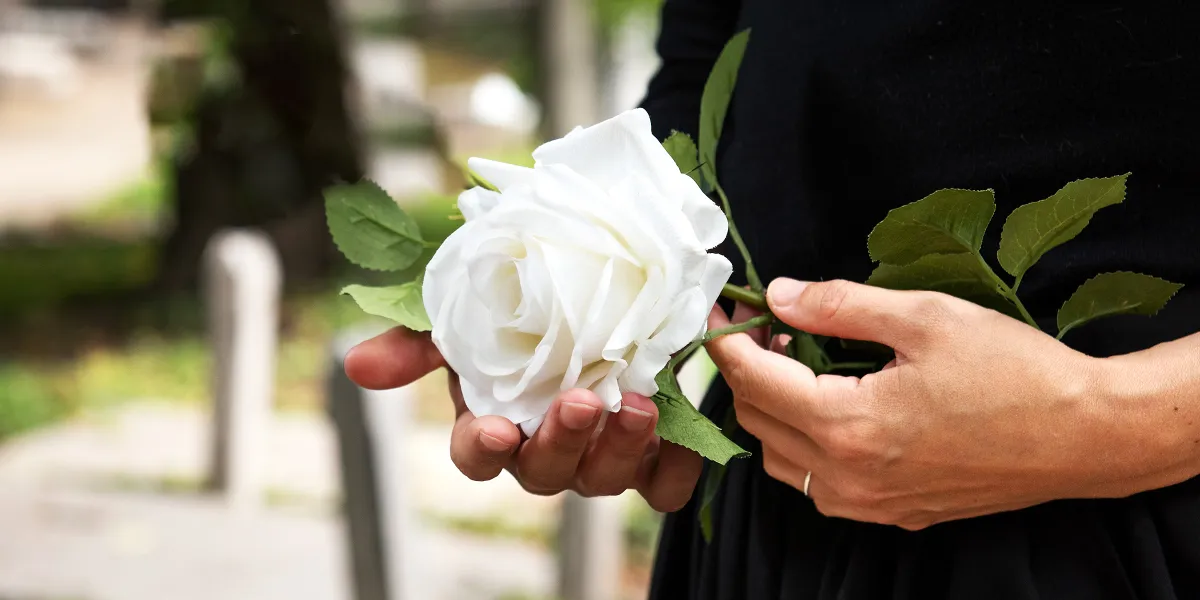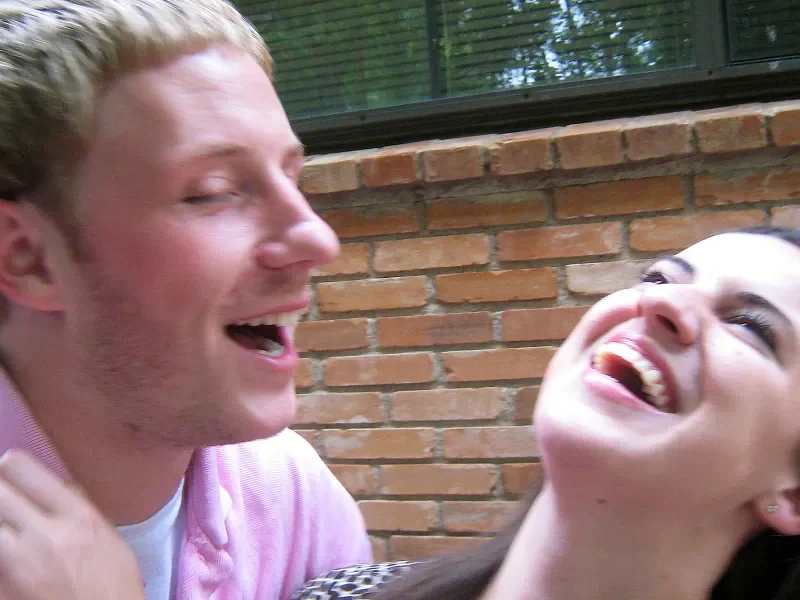After the sudden loss of her daughter, Shay is barely holding herself together, until her husband’s cold urgency to erase the past leads her to a hidden truth. A grief unravels into betrayal, Shay must decide what to let go of… and what to hold on to forever.
The sound of dirt hitting the coffin was dull but each thud felt like it was striking my chest.
I swayed, barely keeping my balance. If it weren’t for Linda’s hand gripping my arm, steady and warm, I might’ve collapsed right there onto the rain-soaked cemetery ground.
The priest’s voice blurred into the wind. People came and went, faces I hadn’t seen in years, hugs I barely felt. All I could see was the casket.
All I could think was: Emily is in there.
My baby girl. Eighteen. Just eighteen years old.
She had plans. Her college brochures were still scattered across her desk, corners folded, notes scribbled in the margins. A spreadsheet of pros and cons glowed faintly from her laptop screen the night before we lost her.
She wanted to become a veterinarian, to work with animals who couldn’t speak for themselves.
“They can’t tell you what hurts, Mom. I want to learn how to listen anyway,” she always said.
Now the house was silent. No more laughter bouncing through the kitchen. No more Indie music playing from her bedroom, or the sound of her wheeled desk chair scraping across the floor while she danced between sentences of her homework.
Just the eerie stillness of a home that had lost its center.
David stood beside me at the graveside, his black suit too crisp, his posture too perfect. His face didn’t move, no twitch, no tear, no cracks in the mask. He looked like a man reciting something memorized for show.
But it had been that way for a long time. The distance between us had opened years ago, quiet at first, until it was just air between strangers playing the part of husband and wife.
On the way home from the cemetery, I leaned my forehead against the car window, watching the world smear past like watercolor bleeding into grey. My throat ached from hours of tears, but now I had none left.
I was just hollow.
“Shay,” David said, clearing his throat. “We should stop by the donation center. I want to check their hours. Linda said she’ll go home and get the food out for people to help themselves. I told her to do it in the backyard.”
“What for?” I turned toward him, confused.
“I think we should start boxing up Emily’s things, Shay. You know… while it’s still fresh. If not, her things are going to stay untouched for years to come.”
“Are you serious right now, David?” I blinked slowly, feeling a migraine come on.
“The longer we hold onto the past, the harder it’ll be to move on. It’s like ripping off a Band-Aid, you do it fast. Think about it, Shay. It makes the most sense.”
“My child was just buried, David. Have some common decency.”
I said nothing else. I couldn’t. I just stared at him, wondering what kind of father was in such a rush to forget.
When we pulled into the driveway, my heart sank with the fact that my child would never run through the hallway again. She’d never come home, kick off her shoes, and ask what I’d made for her to snack on.
Now, walking through the hallway, I noticed that there were already boxes stacked neatly along the wall. Sharpie labels in David’s neat handwriting stared back at me.
Linda told him that staying busy might help. Maybe she meant with dishes and laundry, not erasing our daughter’s existence.
Donate. Toss. Keep.
He had started already.
“When did you do this?” I gasped.
“When you were at the funeral home this morning. You were getting her… ready. I couldn’t do anything else, Shay. It’s my way of processing this.”
I stood in the entryway for a moment, staring at them. It felt surreal, like I’d walked into someone else’s house, one where my daughter had never existed. The boxes made it feel transactional, like grief was a task to complete by next Tuesday.
I didn’t say another word, I just turned and walked upstairs. The bathroom door clicked softly behind me as I locked it. I sat on the edge of the tub, bent forward, and buried my face in my hands.
The sobs that came weren’t loud. They didn’t need to be. They just shook through my ribs like a quiet earthquake. The kind that comes without warning, shifts everything out of place, and leaves you wondering if anything will ever be steady again.
I heard people downstairs, eating the funeral food that Linda and I had ordered. I ignored people knocking at the bathroom door. I ignored Linda asking if I was okay. I ignored everything.
When the house finally went still that night, I crept down the hall to Emily’s room.
The door creaked open like it was reluctant to let me in. Her bed was still unmade, a crumpled hoodie at the foot. Her biology textbook lay beside her pillow, open to a page she’d highlighted in pink.
I sat down gently, as though she might still need the space. I ran my fingers across the spine of the book, then reached for her clothes. One by one, I folded them slowly, not because they needed it, but because it felt like touching her again.
The scent of her shampoo clung to the pillowcase. Her walls were still covered in Polaroids of her friends, our dog, Max, and a few selfies with me.
We were laughing in all of them. I blinked fast, trying to blink away my tears.
“I miss you, baby,” I whispered. “I miss you so much.”
Then I saw her backpack, slouched in the corner like it was waiting for Monday morning.
I knelt beside it and unzipped it slowly. I sifted through the notebooks and pens, all the little things that didn’t seem important, until now.
Tucked inside her history book was a folded piece of paper. I pulled it out and unfolded it slowly.
“Mom, if you’re reading this, look under my bed. You’ll understand everything.”
My breath caught. My hands went cold as the ink blurred slightly from the heat of my fingertips.
Emily’s handwriting. Sharp and deliberate. She must have written this with shaking hands, and still, her instruction was clear. She must have written it after the fight with David, like she knew I’d come searching for answers when he wouldn’t give them to me.
I turned toward the door, empty, silent, and dropped to my knees, my heart thudding in a strange rhythm. My fingers fumbled beneath the bed until they brushed something cardboard, something heavy.
I pulled out a dusty black box from the far corner and sat back on my heels. My whole body was trembling, as if I already knew whatever was inside would change everything.
I lifted the lid.
Inside was a small envelope of photos and a digital voice recorder.
The first photo made my stomach twist. David with a woman I didn’t recognize, her arm casually looped around his waist. He wasn’t just standing there, he was smiling.
Another photo, David, again, holding a toddler. The child had the same wide brown eyes Emily did at that age.
“No,” I whispered, though there was no one to hear me.
I opened the envelope. More photos. There were printed screenshots of bank transfers, hotel bookings, GPS coordinates, and a receipt from a jewelry store. All of it dated over the last seven years.
Seven.
I pressed play on the recorder. Emily’s voice, low but steady, filled the room.
“Dad, why do you have another family?”
“It’s complicated, Emily…” David’s voice took over the room. “I love you both. But I do have another family. And it wasn’t a mistake, Emily. That… my other family has been built on love. I’ve been supporting them for years. Please, don’t tell Mom. She doesn’t need to know.”
“You lied to her,” Emily said, her voice straining. “And to me. All this time? You said those kids were a co-worker’s kids. You told me that you were watching them. Don’t you remember? I found you at the bakery that one summer with them… Why would you lie to your own daughter?”
The recording ended with a sharp breath, followed by silence.
I stared at the photos again. My hands shook so badly I had to set them down. All I could think about was the night of her accident…
It had been three nights ago. Emily’s car skidded off the road, the police said that it was due to hydroplaning. She’d driven that road a hundred times. In daylight, in rain, even once when she was sick with the flu.
But that night… something made her lose control… I kept wondering, was she crying as she drove?
The timeline matched the date of the recording. Too closely.
I heard footsteps on the stairs. I knew they were David’s, slow and deliberate.
I stood up, clutching the recorder in my hand. When he stepped into the room, I didn’t speak. I just held it up in the silence between us.
His face went pale. He opened his mouth but no words came out.
“You were going to throw her things away,” I said, my voice low but unwavering. “The day after her funeral? Because… you knew that she had evidence of your second life somewhere?”
David froze, like the words had slapped him harder than I ever could.
“Shay,” he whispered, stepping toward me slowly, like I might shatter. “Please… I can explain.”
“She knew,” I said. “Emily knew. And she confronted you.”
He dropped to his knees, not out of performance, but like something in him gave out. His hands fell to the carpet. His head hung like a child caught red-handed.
“I didn’t touch her car!” he said, his eyes wide. “I don’t know what you’re thinking but I swear on everything… I never wanted her to… die. My God, Shay, I was going to tell you. I just didn’t know how. She caught me off guard that night. I begged her not to say anything. I told her I’d fix it. And then she… then she died.”
His voice cracked. Tears streamed freely now. But I watched him with a strange, hollow calm.
He shook his head, staring past me at the wall.
“I thought if I could just erase her things, I wouldn’t have to look at the guilt anymore. Every shirt, every book… it screamed what I did. Every time I walked past her door, I couldn’t breathe.”
I wanted to scream. I wanted to throw something. But nothing came. I just felt… quiet. Heavy.
But I didn’t scream and I didn’t cry. I turned and walked out of the room.
The next morning, I filed for divorce. I sat at the kitchen table, the same one where Emily used to do her homework, and signed my name cleanly across every page.
I kept every single one of Emily’s belongings.
And I mailed copies of the photos and voice recording to his other family. I didn’t include a letter or any explanation. Just the truth, exactly as my child had preserved it.
They deserved to know what he kept hidden. I didn’t do it out of malice. I did it because they were living the same lie I had. And no one deserves to be blindsided by a life they didn’t agree to.
David lives alone, paying support to two households that no longer trust him.
And me? Some nights I sit in Emily’s room, holding her hoodie to my chest, listening to the last message she ever left me. I close my eyes and press my face into the fabric.
Even in death, my daughter gave me the truth. And that was the beginning of finally letting David go.
Linda came by the next day. It was a month after Emily’s funeral.
She didn’t ring the doorbell, she just let herself in with the spare key and moved quietly through the house like she didn’t want to wake something sacred. I was sitting on the floor in Emily’s room, her hoodie in my lap, the window cracked just enough to let the breeze in.
Linda sat beside me without saying a word. After a moment, she reached for my hand and held it in both of hers, warm and steady.
“I don’t know how to do this,” I whispered.
“I know,” she said softly. “And you don’t have to know. You just have to breathe.”
“I feel like if I let it out… if I really say it all… I’ll break.”
She looked at me, eyes glassy but clear.
“Then break, Shay. I’ll be right here when you do. I’ll sit with you when the grief is loud, and I’ll sit with you when it’s silent.”
My throat closed. A tear slid down and I let it.
“There aren’t words,” she added. “Not for this kind of pain. But maybe the comfort, small as it is, is knowing she’s still here. In the most beautiful flower, in the brightest rainbow, in the sweetest plum, and in the way the sun rises… even when the world doesn’t deserve it.”
I rested my head on her shoulder. She didn’t move.
And for the first time in days, I let myself cry without holding anything back. There was no fixing. No solution.
Just two women in a quiet room, loving a girl who would never walk through that door again, but would always be everywhere we looked.


